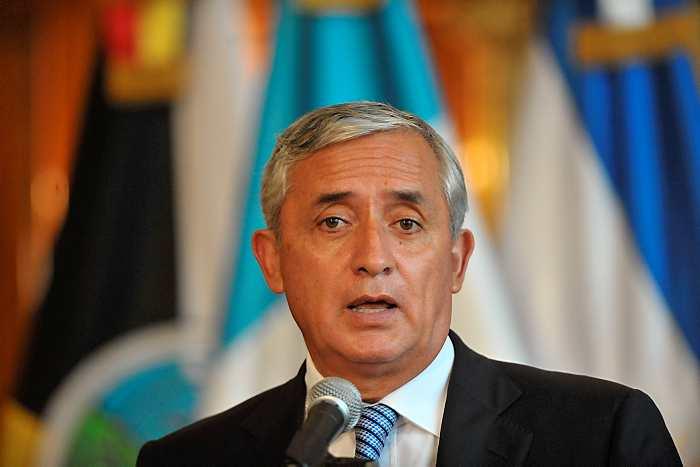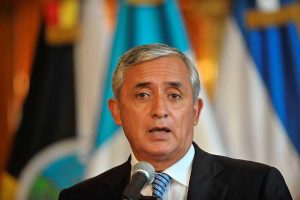Guatemala’s civil war was, by far, Latin America’s bloodiest—leaving approximately 200,000 people dead. A United Nations-supported truth commission found that more than 90 percent of the human rights violations were committed by the military, including over 600 massacres in primarily indigenous villages.
Since the conclusion of the war in 1996, the pursuit of accountability has not gone well.
This past August, a Guatemala City judge sentenced four former soldiers to over 6,000 years in prison, for having participated in a massacre in 1982. This was a good thing, but it is nowhere near enough.
Earlier this month, human rights activist Jennifer Harbury (who has been outspoken on questions of accountability in Guatemala for decades), has cited that some people within Guatemala suspect former army personnel will attempt to turn amnesty into official policy.
Harbury has said that, “within the next few weeks it is very likely that the army officers facing war crimes charges will push through a de facto amnesty, either by removing Claudia Paz, the amazing attorney general, an illegal congressional amnesty (‘punto final’), or through a court ruling canceling international human rights law.”
Since any of the three abovementioned developments would obviate the prospect of any former army official being held accountable for what was undoubtedly genocide, Harbury has implored people to act quickly. This includes her suggestion that people make “emergency” calls to 1600 Pennsylvania Avenue in the coming weeks.
Whether such a plan is actually in the works is not clear; such a scheme certainly would not be surprising.
During his campaign, Otto Peréz intimated that he might sack Attorney General Paz if he were elected president. Although earlier this month, Peréz publicly reiterated that he would not remove Paz from her post once he became president. Was the president-elect being disingenuous?
More recently, Paz has bravely been demanding that on-going Guatemalan genocide cases continue.
Even though she is not necessarily an impartial analyst of Guatemalan politics, Harbury is both knowledgeable and well-sourced—so her claims should not be discounted.
Conversely, it seems unlikely that current president Álvaro Colom or incoming president Peréz would try to get rid of Attorney General Paz. A Paz Attorney Generalship fits in so nicely with Pérez’s firm anti-crime stance and his forthcoming battle against drug traffickers. She is probably not going anywhere.
Pérez could reserve the right to remove her later for any number of reasons, like ineffectiveness or baseless allegations of corruption.
There is also a sad and bitter reality that that the current dialogue about amnesty in Guatemala has missed: To a great extent, former Guatemalan security personnel have already won. In Guatemala, one rarely sees justice of any kind. About two months ago, a court ruled that erstwhile Guatemalan dictator Óscar Mejía was “too sick” to face charges of war crimes. Similar judicial decisions would not be surprising.
Like anywhere else, holding former military personnel accountable for past atrocities or violations of international humanitarian law poses enormous challenges.
In spite of the progress Attorney General Claudia Paz y Paz has made, human rights supporters are going to be dissatisfied regarding Guatemalan war crimes trials and broader questions of accountability.
Guatemala’s impunity-laced past only helps foment on-going human violations and pervasive lawlessness which outgoing president Álvaro Colom has done nothing to address.
According to the US State Department, Guatemala’s current prosecution rate is somewhere between two and three percent.
The current White House petition that Harbury and others are pushing could be a helpful awareness-raising exercise, although it is unlikely to have a significant impact on Guatemalan or US policy.
Few of Guatemala’s former military men will ever be brought to justice.
The November election of former General Otto Peréz-Molina served as a rather sickening reminder of this. What could possibly further exemplify a resounding post-conflict “army victory” than an Otto Pérez presidency?
If Harbury is right and a push for amnesty is in the works, US intelligence assets in Guatemala would be well-aware of such a plan and would have probably already briefed the White House.
President Obama should publicly denounce any move by Guatemalan army officers for amnesty related to war crimes.
It is also important to remember that Guatemala’s civil war was not just a battle between a well-funded Latin American army and a leftist insurgency; that is an oversimplification. There were far more actors than that, including United States civilians and military personnel.
For starters and principally for ideological reasons that arose during the Cold War, the US had much to do with the Guatemalan military’s past “successes.”
Through financial support, training, and other forms of assistance, President-elect Otto Pérez is a product of those mistakes.
President Obama called Pérez to congratulate him on his electoral victory in late November, but only mundane talking points were released to the public.
One would hope President Pérez receives a tepid response when he makes his first trip to Washington, even though history suggests otherwise.
This article was originally published in The Journal of Foreign Relations.








That war was never a CIVIL WAR. It started with the U.S. aggression in 1954, it continued when the U.S. brought to Guatemala the cuban gusanos from MIami to train them for the aggression again against Cuba in 1961. Cuba had learned about the aggression against Guatemala and beat the gusanos and their fathers, the CIA. That is when the young military officers started, so was a “civil war” amongst the military only?
The first and only guilty party there was the U.S. It was the u.s. who trained and paid every penny used in that war, included the cost of a battalion of jewish cutthroats and torturers from Israel. So guy go back to school and learn he truth.
Miguel,
“This war was never a civil war.” Really?
Your comments make you seem very ignorant. I do not think the writer has written a great article but he directly implicated the United States. Do you really feel that the US was the only guilty party?
If that is what you believe, you sir, are clearly an idiot and either should go back to school yourself or at least try to improve your reading comprehension.
I gave you the main elements in the conflict.
Yes again the U.S. or Americaca as you may prefer, started it, financed it, and trained it. e.g. Do you know that almost two generations of the Guatemalan army, officers and enlisted men, wen to Fort Benign for training in torture and genocide? One example, Nicaragua:As Somoza lost the U.S. support, the whole regime fell within 60 days.
Killing some 200,000 unarmed indian civilian, including women and children is a civil war? Its real name is genocide. The rebel forces never had more than 5,000 fighters. Please think, think, thin… the basic elements. The CIA always kept a tight control of everything there from the beginning until they were torturing an american nun “because she was chicana from New Mexico” So, don´t make me laugh with the american bullshit. Where was the U.S. all during that war? What happened there? Sorry guy, but you are as lost as the U.S. armed forces, all of them finding the weapons of mass destruction in Irak.
Dear Miguel,
You are ignorant. I am very surprised that you are even aware of a website like this, where most readers seem to be at least reasonably informed when they do post comments.
Again, in the article, Mr. Dibbert mentioned US involvement.
Then in your response you mention Nicaragua and the torturing of an American nun. You finish your amazingly shrewd analysis with an apposite reference to the US not finding weapons of mass destruction in Iraq.
While it is clear that you are not a native English speaker, I hope you are not using your real name to post these responses because (in addition to the fact that it looks like you have not quite mastered English) you look very stupid in terms of the way you frame an analytical argument. You should post a mature response or stop commenting; you are embarrassing yourself.
Look, I sent you a comment in Spanish, the carrier did not send it. I also speak and write French, Italian and Portuguese. I live and work in Fortaleza, Brasil. I really do not care whatever you guys think.
In Spanish people says that, there are no worst blind person than the one that do not want to see, also, the same for deft and ALSO for stupid.
You should join the demonstrations of the indignados, or the people that demonstrate everyday against the u.s. system.
So, please do not answer this because tomorrow I am leaving for Fortaleza and I have to work.
Dear Miguel,
Your comments are becoming more ridiculous and less relevant. You are an idiot. Are readers of this website supposed to be impressed that you speak and write French, Italian and Portuguese? Why is it at all relevant to mention that you live and work in Fortaleza, Brasil?
Then you go on to claim: “I really do not care whatever you guys think.”
This is contradictory to the previous sentences you have written which were self-congratulatory and gratuitous.
Then you say: “You should join the demonstrations of the indignados, or the people that demonstrate everyday against the u.s. system.” Again, this type of incoherent garbage is not going to be tolerated on a website like Foreign Policy Journal.
Disagreement is fine, but you should be able to cite facts in an organized fashion so that you can support your initial rant. All of your posts have been bereft of any sort of intellectual rigor and are extremely immature.
I would encourage you to think before you make comments on articles in the future. Or go post shallow, thoughtless comments on a less serious website. I am not the only reader of FPJ who thinks you have embarrassed yourself, trust me.